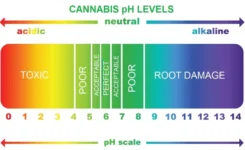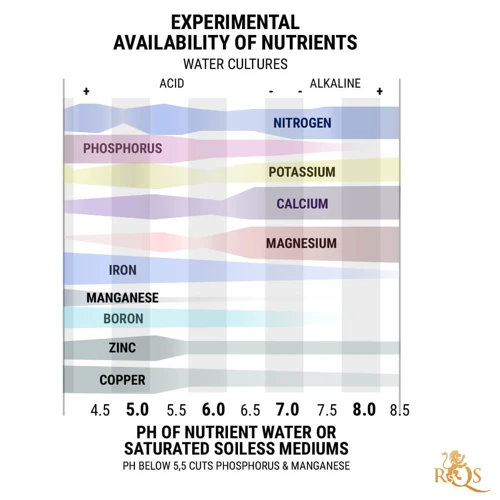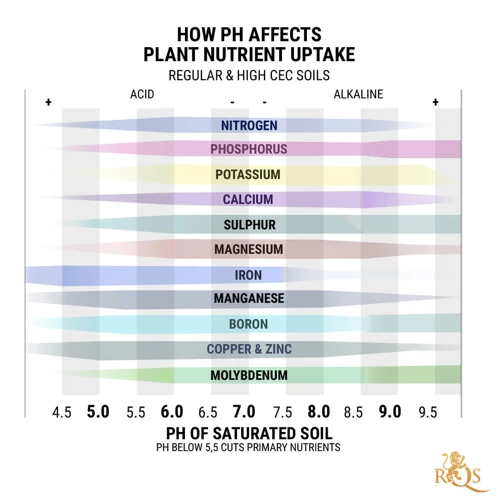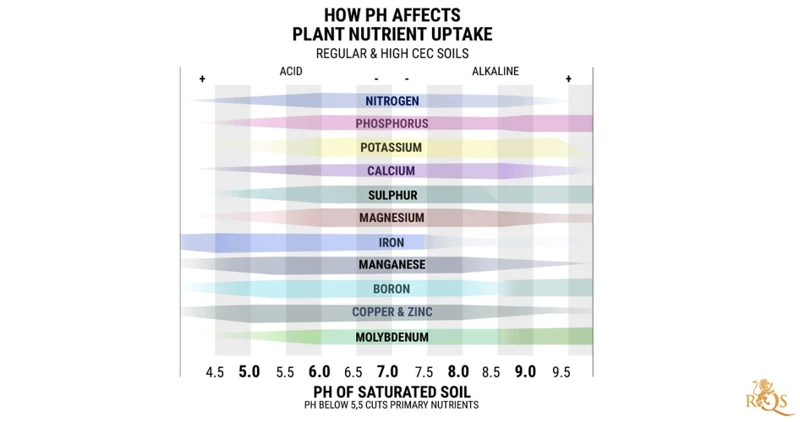
Understanding pH Balance in Soil for Optimal Cannabis Growth
As a cannabis grower, you understand the importance of providing your plants with the right conditions for optimal growth. However, one of the most overlooked yet crucial factors in the growth process is maintaining the proper pH balance in your soil. The pH balance determines the availability of nutrients that your cannabis plants can absorb, and any imbalance can lead to stunted growth or even death. This article will provide you with a step-by-step guide to understanding pH balances in soil and why it is so critical for your cannabis plants’ health and vitality.
What is pH Balance and Why is it Important?
Contents
Have you ever heard the term “pH balance” when it comes to soil? pH balance refers to the level of acidity or alkalinity in the soil, and it’s an important factor to consider for optimal cannabis growth. Understanding and maintaining the proper pH balance in the soil is crucial, as it affects the plant’s ability to absorb nutrients and thrive. In this section, we will dive deeper into what pH balance is, its importance, and its impact on cannabis growth.
Understanding pH Balance
To understand pH balance, we must first understand what pH means. pH is a measurement of the acidity or alkalinity of a substance, and it is measured on a scale of 0 to 14, with 0 being the most acidic and 14 being the most alkaline. A pH of 7 is considered neutral, neither acidic nor alkaline.
In soil, pH is important because it affects the availability of nutrients that are necessary for optimal cannabis growth. When the pH is too low or too high, certain nutrients become less available to the plant, and this can lead to stunted growth, yellowing of leaves, and other problems.
Soil pH is influenced by a variety of factors, including the parent material from which the soil was formed, the types of rocks and minerals present in the soil, and the amount of organic matter present. Knowing the pH of your soil is important because it allows you to adjust the pH to a level that is optimal for cannabis growth.
To summarize, pH balance is important because it affects the availability of nutrients in soil, which can directly impact the growth and health of cannabis plants. Understanding the factors that influence soil pH is essential for ensuring proper nutrient uptake and overall plant growth.
The Importance of Proper pH Balance for Cannabis
Proper pH balance is crucial for cannabis growth as it affects the plant’s ability to absorb nutrients from the soil. Nutrients such as nitrogen (N), phosphorus (P), and potassium (K) are only available to the cannabis plant when the pH level of the soil is within a specific range.
For example: The nutrient phosphorus (P) is most readily available to cannabis when the soil pH is between 6.0 and 7.5. However, if the soil pH is either too high or too low, the phosphorus will become less available to the plant, resulting in stunted growth and lower yields.
Aside from nutrient availability, pH balance also affects other aspects of cannabis growth. At the optimal pH level, the plant can absorb more water which leads to healthier roots, stronger stem, and increased growth overall. On the other hand, if the pH is too high or too low, the plant may struggle to absorb enough water and nutrients, leading to nutrient deficiencies and other complications.
In addition to plant growth, pH balance can also impact the quality of the cannabis produced. If the pH levels are not within the recommended range, it can affect the terpene profile and potency of the cannabis plants.
It is essential to maintain the proper pH balance in the soil for optimal cannabis growth and development. The table below highlights the recommended pH ranges for cannabis growth.
| Nutrient | Optimal Soil pH Range |
|---|---|
| Nitrogen (N) | 6.0 – 7.0 |
| Phosphorus (P) | 6.0 – 7.5 |
| Potassium (K) | 6.0 – 7.0 |
| Calcium (Ca) | 6.2 – 7.0 |
| Magnesium (Mg) | 6.0 – 7.0 |
| Sulfur (S) | 5.5 – 7.5 |
Maintaining the pH levels within these recommended ranges will ensure optimal nutrient uptake, strong growth, and high-quality cannabis.
Determining Soil pH Levels
One key factor in ensuring optimal growth for cannabis plants is maintaining the proper pH balance in the soil. In order to do this, it’s important to determine the current pH levels of your soil. However, with several testing methods available, it can be overwhelming to decide which one to use. In this section, we will explore various methods for testing soil pH, as well as recommended pH levels for cannabis growth.
Methods for Testing Soil pH
Testing the pH levels of your soil is an essential step towards growing healthy cannabis plants. There are several methods to test soil pH, including:
- Using a Soil pH Tester: This method involves using a soil pH tester kit that measures the pH of your soil. The kit usually comes with a probe and digital display that shows the pH level. It’s an easy and accurate way to determine the soil pH.
- DIY Soil pH Test: This method involves collecting soil samples from different parts of your grow area and testing them with a homemade solution. To make the solution, mix one part soil with five parts distilled water and let it sit for 30 minutes. Then, mix a small amount of baking soda with the soil water. If the mixture fizzes, it means the soil is acidic, while no reaction indicates alkaline soil.
- Litmus Paper Test: This method involves using litmus paper to test soil pH, which is a simple and cheap option. Take a sample of soil and mix it with distilled water. Then, dip the litmus paper into the solution and compare the color with the pH scale provided in the kit.
- Laboratory Testing: This method involves sending a soil sample to a laboratory for testing. It’s the most accurate but also the most expensive option. The lab will provide a detailed report, including the nutrient content and pH level of your soil, allowing you to make informed decisions about fertilizing and pH adjustment.
When testing soil pH, it’s recommended to take multiple samples from different locations in your growing area as pH level can vary among different spots due to factors such as drainage, sunlight exposure, and nutrients.
Recommended pH Levels for Cannabis
When it comes to the pH levels of soil for cannabis growth, it’s important to note that the ideal pH range varies throughout the plant’s life cycle. Here are the recommended pH levels to keep in mind for each stage:
- Seedling Stage: During the first few weeks of growth, the pH level should be between 5.5-6.5. This pH range provides the optimal conditions for nutrient uptake and promotes healthy root development.
- Vegging Stage: As your plants enter the vegetative stage, the pH should be maintained at around 6.0-7.0. A higher pH level in this stage can help encourage more vegetative growth and larger leaves.
- Flowering Stage: During the flowering stage, it’s recommended to keep the pH between 6.0-7.0. This ensures that your plants are able to properly absorb the necessary nutrients to promote healthy bud development.
It’s important to remember that maintaining the proper pH levels is crucial for the overall health and yield of your plants. Not adhering to the recommended pH levels can result in stunted growth, nutrient deficiencies, and poor yields. Regularly testing and adjusting the soil pH levels is key to ensuring optimal cannabis growth.
Adjusting Soil pH Levels
When it comes to growing cannabis, achieving the proper pH balance in soil is crucial for optimal growth and yield. Unfortunately, not all soil is created equal, and it’s not uncommon for growers to discover that their soil pH is outside of the ideal range for their plants. In this next section, we’ll explore the various methods for adjusting soil pH levels, including the use of pH Up and pH Down solutions, natural remedies, and some common mistakes to avoid. So, let’s roll up our sleeves and dive into the world of soil pH management!
Using pH Up and pH Down Solutions
Adjusting Soil pH Levels: Using pH Up and pH Down Solutions
One of the most common ways to adjust soil pH levels is by using pH up or pH down solutions. These solutions are typically sold at gardening stores and online, and can be found in liquid form or as powders. Before using these solutions, it’s important to determine the current pH level of the soil using a pH tester.
Once you know the pH level of your soil, you can begin adjusting it using the following table:
| Current pH Level | Action Needed |
|---|---|
| Less than 6.0 | Use pH up solution |
| 6.0 to 7.0 | No action needed, optimal range for cannabis growth |
| Greater than 7.0 | Use pH down solution |
When using pH up or pH down solutions, it’s important to follow the instructions on the label carefully. Typically, a small amount of solution is added to water and mixed well before being added to the soil. It’s important to monitor the pH level closely after adding the solution, as it can change quickly.
It’s also important to remember that pH up and pH down solutions can be strong and potentially harmful if not used properly. Be sure to use gloves and eye protection when handling these solutions, and always keep them out of reach of children and pets.
If you prefer to avoid using these commercial solutions, there are natural ways to adjust soil pH as well.
Natural Ways to Adjust Soil pH
Adjusting soil pH levels doesn’t always have to involve the use of synthetic solutions. In fact, there are several natural ways in which you can adjust the pH level of your soil.
1. Use Organic Matter: Adding organic materials such as compost, manure, or peat moss to the soil can gradually decrease its pH levels. These materials contain natural acidifiers which help to lower the pH levels.
2. Use Sphagnum Peat: Sphagnum peat moss is an organic material that is slightly acidic in nature. It helps to lower soil pH levels and is easily available at most garden centers.
3. Use Coffee Grounds: Coffee grounds are an excellent source of acidifiers. They can be added to the soil to help lower its pH levels. However, it is important not to use too much coffee grounds as it can lead to other problems like nitrogen toxicity.
4. Use Vinegar: White vinegar is an effective natural solution for lowering soil pH levels. However, this method should be used with caution as overuse can potentially harm the plants.
5. Use Elemental Sulfur: Elemental sulfur is a natural way to lower soil pH levels. It can take some time for the pH levels to decrease using this method, but it is a safe and effective way to adjust soil pH.
No matter which natural method is chosen, it is important to monitor soil pH levels regularly to ensure the desired pH level is reached. Additionally, it is important to test the pH levels regularly to avoid overcompensating and accidentally altering the pH level too much in the opposite direction.
Mistakes to Avoid When Adjusting Soil pH
When it comes to adjusting soil pH levels for optimal cannabis growth, there are a few mistakes to avoid to ensure success. Here are some common errors to steer clear of when adjusting soil pH:
| Mistake | Description | Solution |
| Not testing pH levels often enough | Waiting too long between pH tests can lead to drastic imbalances that are difficult to correct. | Test soil pH levels regularly, ideally once per week or every other week, to catch imbalances as they occur and make necessary adjustments. |
| Overcorrecting | Adding too much pH Up or pH Down can result in pH levels that are too high or too low, creating stress for cannabis plants. | Always add small amounts of pH Up or pH Down at a time, testing pH levels frequently in between, until the desired level is reached. |
| Ignoring soil type | The type of soil being used can affect how much pH Up or pH Down is needed to balance pH levels. | Research the type of soil being used and adjust pH levels accordingly, being careful not to overcorrect. |
| Using improper pH testing methods | The method used to test pH levels can affect accuracy and lead to incorrect adjustments. | Use a reliable pH testing kit that is appropriate for the type of soil being used, and follow instructions carefully. |
| Not giving plants time to adjust | After making adjustments to soil pH, it’s important to give plants time to adjust before testing again. | Wait at least 24 hours after making adjustments to test pH levels again and make additional adjustments if necessary. |
By avoiding these common mistakes, growers can adjust soil pH levels with confidence and provide optimal growing conditions for their cannabis plants.
Frequently Asked Questions
As you delve deeper into the topic of pH balance in soil for optimal cannabis growth, you may find yourself with some burning questions. It’s perfectly normal to feel this way since there are many nuances and factors to consider when it comes to maintaining the pH levels of soil. In this section, we’ll address some of the most commonly asked questions about pH balance in soil for cannabis cultivation. Ready to expand your knowledge and have your queries answered? Keep reading!
How Often Should Soil pH Levels be Tested?
Testing the pH levels of soil is an essential task for any cannabis cultivator. It determines the soil’s alkalinity and acidity, which is essential for optimal cannabis growth. The frequency of testing soil pH levels depends on various factors, including the type of soil, water source, and fertilizers used.
To maintain a healthy pH level, it is recommended to test the soil pH periodically throughout the growth cycle of cannabis. The frequency of testing soil pH levels may vary depending on the type of growing medium used. For example, those using hydroponic systems may need to test the soil pH more often than those using soil.
Typically, it is recommended to test soil pH levels every two weeks during the vegetative stage and every week during the flowering stage. This is because the fertilizers and nutrients used during this stage can significantly impact the soil’s pH level, and thus, if left unchecked, can cause various problems for cannabis growth.
It is vital to consider other factors that can affect soil acidity or alkalinity, such as water or fertilizer. Water sources may contain minerals, and fertilizers may contain compounds that can affect the soil pH level. It is crucial to test the soil pH after adding new water or fertilizer to ensure that the soil’s pH level remains in the ideal range.
Keeping track of the soil pH level regularly ensures that you can identify any issues before they become significant problems that may harm your cannabis plant’s growth. Testing soil pH levels is an essential task that every cannabis cultivator should perform regularly to maintain optimal soil pH levels for healthy and productive cannabis growth.
Can Soil pH be Too High or Too Low for Cannabis?
Cannabis plants are very sensitive to soil pH levels. If the pH level is too high or too low, it can lead to several problems that may affect the growth and development of the plant. Here are some of the problems that can arise from soil pH levels that are too high or too low:
- Too high pH level: When the soil’s pH level is too high, the plant may suffer from an iron deficiency, which can cause yellowing between the leaf veins. This condition is known as interveinal chlorosis. The plant may also struggle to absorb other essential nutrients like manganese and zinc.
- Too low pH level: On the other hand, if the soil’s pH level is too low, the plant may suffer from aluminum toxicity. Aluminum toxicity can cause stunted growth, poor root development, and damaged roots. The plant may also experience nutrient deficiencies, particularly in calcium, magnesium, and phosphorus.
It is important to maintain the soil pH level within the recommended range to ensure that the cannabis plant grows healthy and strong. Testing the soil pH level regularly and making adjustments as necessary can prevent these problems from happening.
What Happens if Soil pH is Not Corrected?
When the soil’s pH balance is not corrected, it can have negative consequences on the growth and development of cannabis plants. Here are some potential outcomes:
- Poor Nutrient Uptake: Cannabis plants require a specific pH range in order to absorb the necessary nutrients for growth. If the soil pH is too high or too low, the plant roots will struggle to take in nutrients and may become deficient in key elements like nitrogen, phosphorus, and potassium.
- Stunted Growth: When nutrient uptake is compromised due to incorrect pH levels, cannabis growth can be significantly impacted. Stunted growth is a common result, with plants remaining small and underdeveloped.
- Yellowing Leaves: ‘Chlorosis’ is a term used to describe leaf yellowing caused by nutrient deficiencies. When the soil pH isn’t balanced, the plant may struggle to absorb enough iron, causing the leaves to turn yellow.
- Pest and Disease Susceptibility: An unhealthy plant caused by incorrect pH levels can attract pests and diseases that can further harm the cannabis crop.
- Reduced Yield: The ultimate outcome of incorrect soil pH levels is reduced cannabis yield. A stressed plant will produce less bud, and the quality of the flowers may be compromised as well.
It is important to regularly test and adjust soil pH for optimal cannabis growth and yield. By maintaining the proper pH balance, growers can ensure that their plants have access to the nutrients they need to thrive and produce high-quality buds.
Conclusion
After reading this article, you should now have a deeper understanding of the importance of pH balance in soil when it comes to growing cannabis. It’s crucial to maintain proper pH levels in your soil to ensure your plants can fully absorb the nutrients they need to thrive.
Remember to regularly test your soil pH levels using one of the recommended methods. Testing ensures you can make adjustments as needed to keep your pH levels within the optimal range.
Adjusting soil pH can be done using either pH Up and pH Down solutions or natural methods. Whichever method you choose, be sure to avoid common mistakes like over-correcting your pH levels, using tap water without checking its pH, or not allowing enough time for the pH level to stabilize before retesting.
While it can be tempting to overlook pH balance in your soil, doing so can have negative consequences for your cannabis plants. Plants grown in soil with improper pH levels may receive an insufficient amount of nutrients, suffer from stunted growth, or even die.
By prioritizing pH balance in soil and making adjustments as needed, you can set your cannabis plants up for success and achieve robust yields with potent buds. With a bit of patience and effort, you can maintain optimal pH levels in your soil and enjoy a successful cannabis harvest.
Frequently Asked Questions
How does soil pH affect cannabis plants?
Soil pH levels have a big impact on the nutrient uptake of cannabis plants; if the pH levels are not balanced, the plant will struggle to absorb the necessary nutrients required for growth.
What is the ideal pH level for cannabis plants?
The ideal pH level for cannabis plants is between 6.0 and 7.0.
Can I measure soil pH levels without a testing kit?
It is difficult to measure soil pH levels accurately without a testing kit, but there are some natural indicators you can use, such as the appearance of plants and the presence of certain weeds.
Can I adjust soil pH levels using household products?
Some household products, such as vinegar and lemon juice, can be used to adjust soil pH levels, but it is important to be careful as overuse could damage the plants.
What is the risk of over-correcting soil pH levels?
If soil pH levels are over-corrected, it can lead to nutrient deficiencies or toxicities, resulting in stunted growth, yellowing leaves or even death of the plant.
How long does it take to see the effects of adjusting soil pH levels?
The effects of adjusting soil pH levels can be seen within hours if using a pH adjuster solution, but if using natural methods, it could take up to a few weeks.
Can different strains of cannabis require different soil pH levels?
Yes, some strains of cannabis are more sensitive to pH levels than others, and so it is important to research the optimal pH level for the specific strain being cultivated.
When is the best time to test soil pH levels?
It is best to test soil pH levels before planting cannabis, and then regularly throughout the growing process to ensure the levels remain balanced.
How can I naturally adjust soil pH levels?
Natural ways to adjust soil pH levels include adding organic matter, such as compost or manure, or adding lime for acidic soil and sulfur for alkaline soil.
What is the harm in having unbalanced soil pH levels?
Unbalanced soil pH levels can lead to nutrient deficiencies, toxicities, and poor overall plant health, resulting in stunted growth or even death of the plant.





